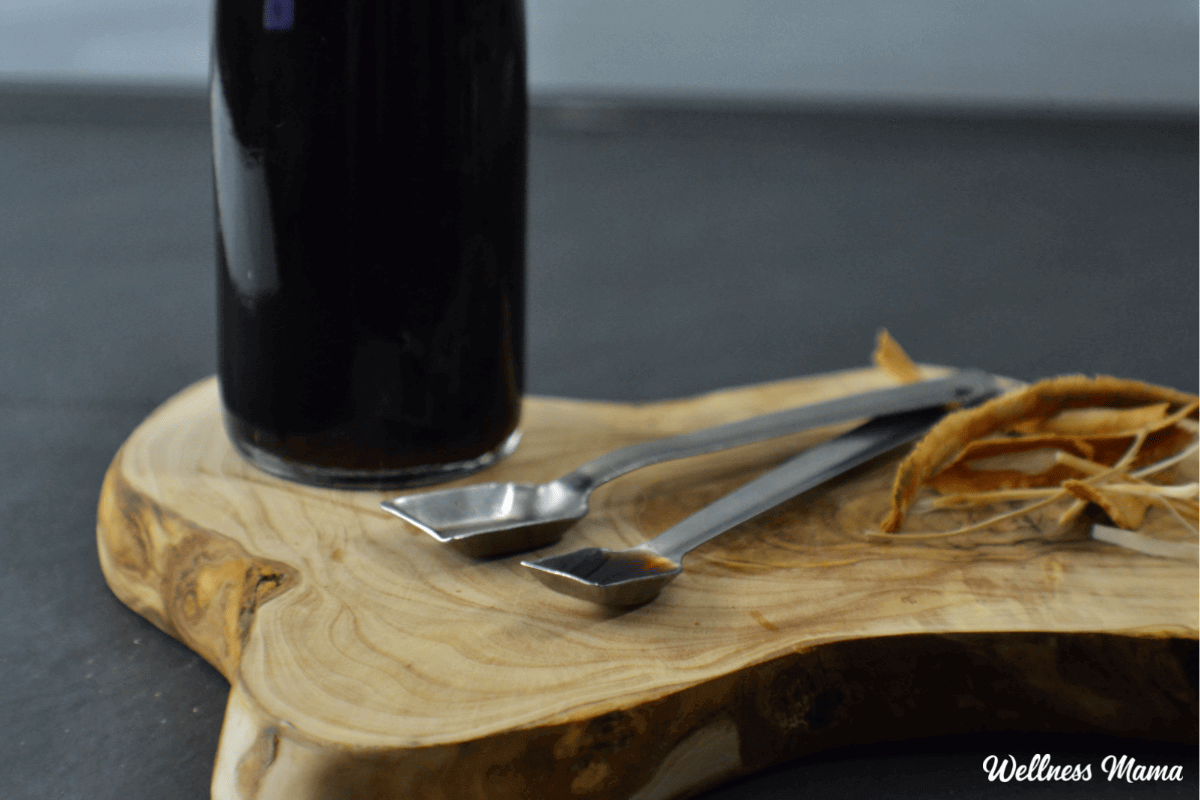Over the years I’ve collected some tried and tested flu remedies to keep my family feeling our best. While I love my garlic, raw honey, and elderberry, it’s nice to have a few targeted remedies in the arsenal. This wild cherry bark cough syrup helps soothe persistent coughs, especially at nighttime.
How to Use Wild Cherry Bark Cough Syrup
When people think of cough syrup, visions of red-dyed, artificially cherry-flavored concoctions come to mind. Conventional cough syrup works by suppressing the cough though, not fixing the problem. The trick is there’s more than one type of cough.
We can have a wet cough with lots of mucus. We can have a dry cough where nothing is coming up. We can have coughing fits that lead to spasms so intense they make your ribs hurt. Different herbs help with different kinds of coughs.
My herbal cough syrup is a great all-around cough remedy that I reach for often during cold and flu season. This wild cherry bark cough syrup though is particularly good with dry, hot, irritated coughs. Traditionally it’s been used for whooping cough, chronic coughs, pneumonia, and bronchitis.
Wild Cherry Bark Cough Syrup Benefits
Harvested from the inner bark of wild cherry trees, this plant medicine has a wide range of benefits. Wild cherry bark helps to open up the lower respiratory system to move stuck mucus up and out while drying it up. It has a calming effect that eases coughing spasms that lead to irritated throats. Wild cherry’s calming and nervine properties make it useful for nighttime coughing that makes it hard to sleep.
This herb is cooling to soothe sore, red, and inflamed tissues in the sinuses and throat. It’s not just useful for the occasional cold though. Wild cherry can help ease asthma symptoms, strengthen heart health, and help improve digestion.
Mullein for Scratchy Throats
You may have seen mullein with its tall stalk of yellow flowers along the roadsides. Although the leaves look warm and fuzzy, they have tiny hairs that can irritate tissues! When it’s well strained though, mullein leaf tea or syrup is fantastic for coughs and irritated throats.
Like wild cherry bark, mullein helps us cough up mucus and relieves inflammation and spasms. Mullein is especially good for moving stuck congestion and calms wheezing and unproductive coughing. If there’s a lung issue, mullein is the herb to reach for.
A Boost of Vitamin C
Vitamin C is key to a healthy immune system and skin (among other things). Some of the best sources include lemons, camu camu berry, and bell peppers. Rosehips are also really high in vitamin C and have a tart, fruity taste. They help tighten and tone tissues, fight free radical damage, and are cooling to inflamed areas.
Hibiscus flowers are also high in vitamin C with a tangy taste. Not only is hibiscus great for tea, it gives hair a reddish tint when used in natural hair dye. If you don’t have any rosehips on hand, then hibiscus will also work. Some herbalists don’t recommend consuming hibiscus during pregnancy since there are some reports it can stimulate the uterus.
Elderberry
Elderberry is super popular nowadays and you can find my personal elderberry syrup recipe here. In this cough syrup recipe, the elderberry is playing a supporting role instead of stealing the show. Elderberry is antiviral and great for flu season. High in vitamins A, B, and C elderberry can shorten the duration and severity of flu, even preventing it. I’ve added it to my wild cherry bark cough syrup to give it an antiviral kick and even more berry flavor.
How to Make the Wild Cherry Bark Cough Syrup
Homemade cough syrup may look intimidating, but the recipe is honestly simple. We’re basically making herbal tea and then stirring in some raw honey. There are a few things to keep in mind here though.
Mullein leaves contain little tiny hairs that can be irritating to the skin. Irritated tissues are the last thing we want when we’re trying to soothe an already irritated throat! To prevent any issues be sure to strain the tea well with a cloth or paper coffee filter.
There’s a lot of debate in the herbal world about the best way to use wild cherry bark. Some people simmer it to make syrup, while others insist on a cold infusion. After some research, I came to the conclusion that simmering seems to work well and was the easiest option here.
Safety Considerations
As mentioned before, hibiscus might be unsafe during pregnancy, but opinions are mixed. Doctor and herbalist Aviva Romm considers hibiscus safe during pregnancy. However, Dr. Romm does consider wild cherry bark to be contraindicated while pregnant in her book Botanical Medicine for Women’s Health.
There doesn’t seem to be any evidence of harm in humans with using cherry bark in pregnancy. However, some animal studies showed a possible increased risk of harm that may or may not apply to humans. Other seasoned herbalists, including Dr. Sharol Tilgner and Jim McDonald, don’t see any concerns with using cherry bark during pregnancy.
So what’s the bottom line? The waters are a little murky here so if you’re pregnant and want to stay on the safe side, then skip this recipe. In general, it’s very safe, even for little ones. Since we’re using raw honey don’t use the wild cherry bark cough syrup for infants under age 1 though.

Wild Cherry Bark Cough Syrup
Servings
Ingredients
- ⅓ cup wild cherry bark
- ¼ cup mullein leaf
- ¼ cup rose hips or hibiscus
- 1 cup raw honey
- 2 cups water be sure to use filtered
- 2 TBSP dried elderberries Optional
Instructions
- Combine the herbs and water in a saucepan and bring to a boil.
- Reduce the heat to a simmer and cook until the liquid has reduced to about 1 cup. This will take about 30-40 minutes.
- Strain out the herbs with a coffee filter and measure the liquid. Add enough water to reach 1 cup, or simmer it some more until there's only 1 cup.
- Once the mixture is warm but not piping hot, stir in the honey.
Notes
This article was medically reviewed by Madiha Saeed, MD, a board certified family physician. As always, this is not personal medical advice and we recommend that you talk with your doctor.
What’s your favorite way to soothe a scratchy throat? Leave us a comment and be sure to share this post with a friend!


Leave a Reply